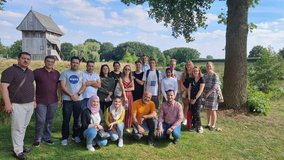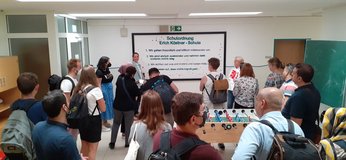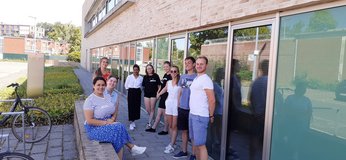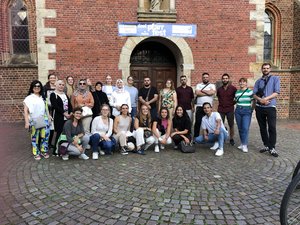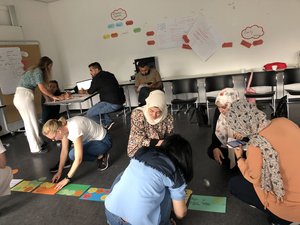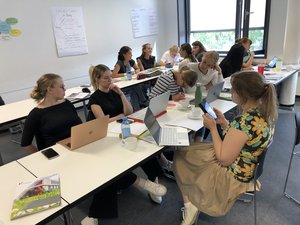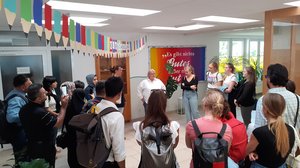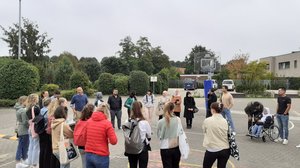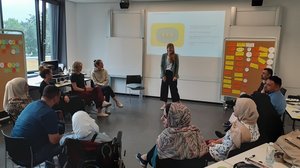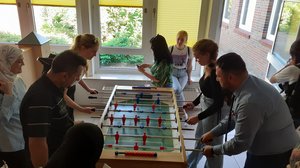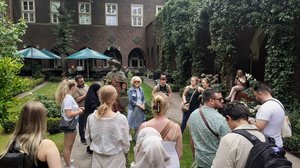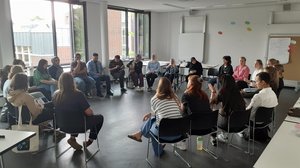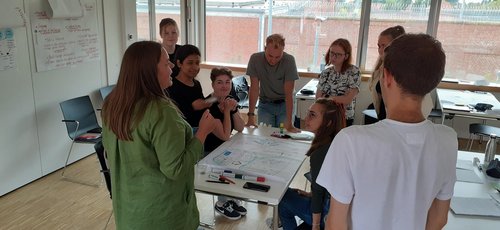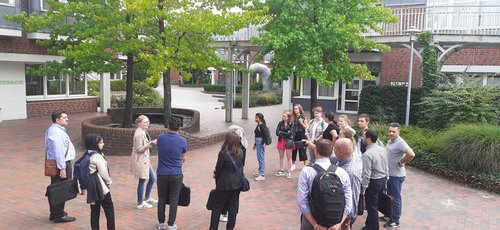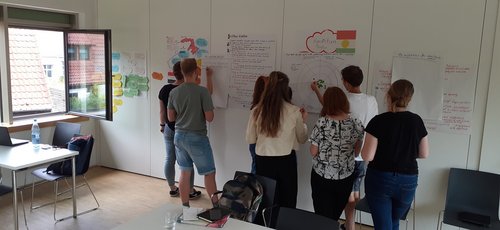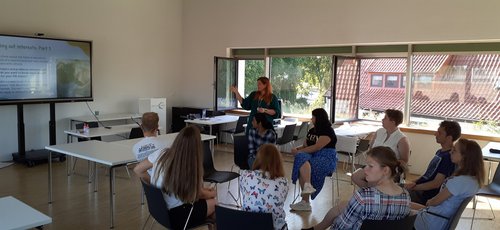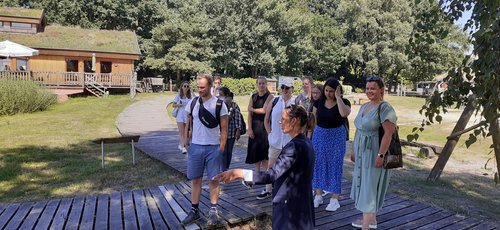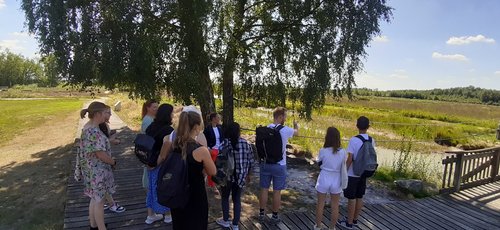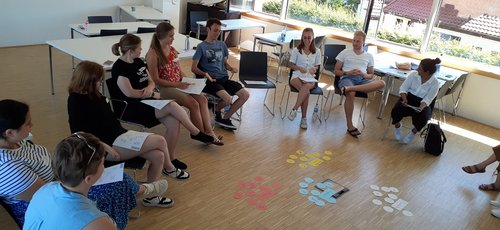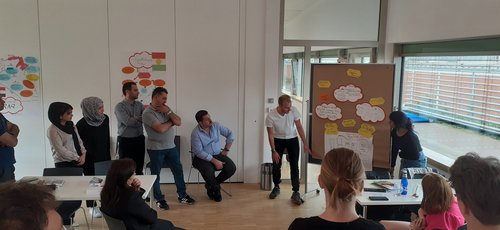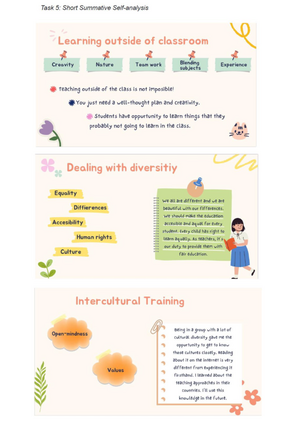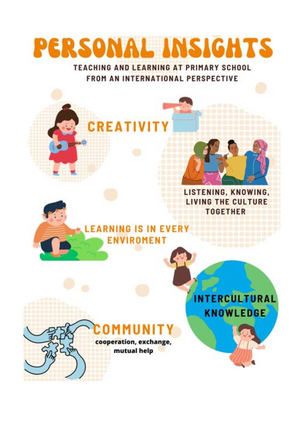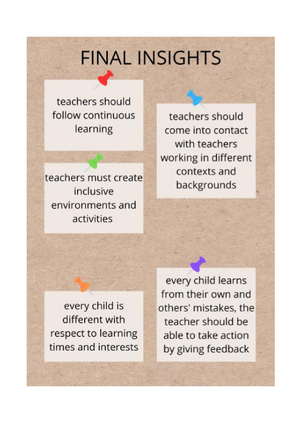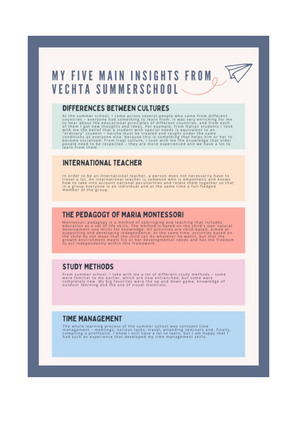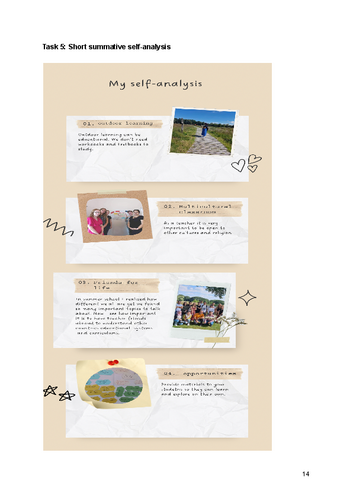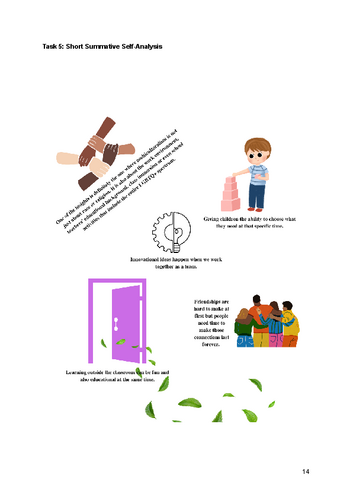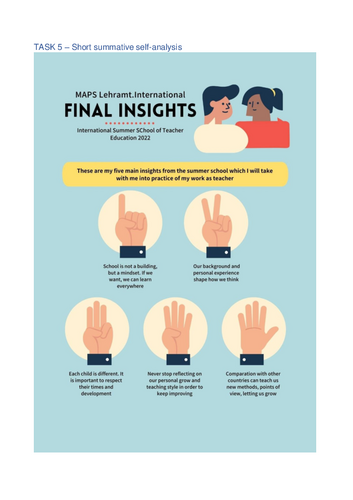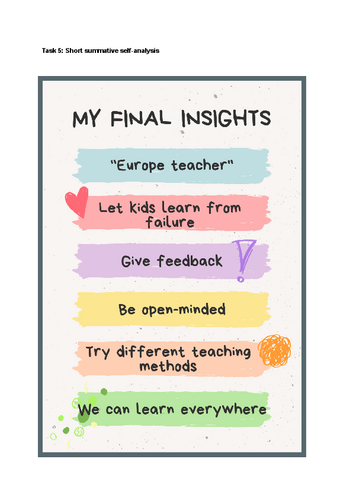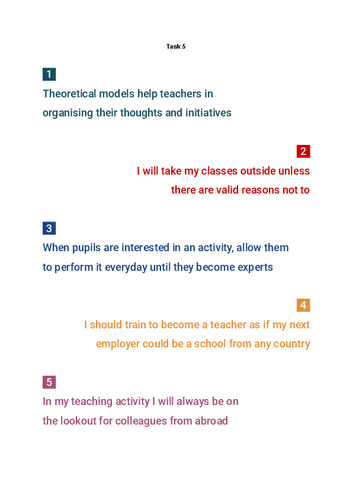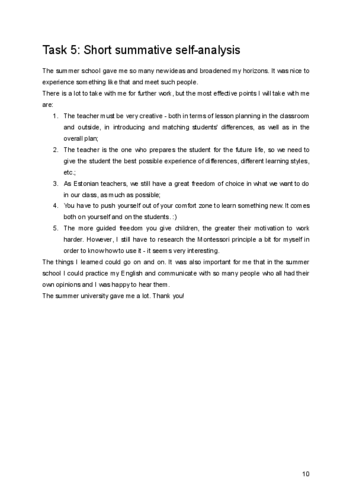International Summer School of Teacher Education 2023
The International Summer School of Teacher Education will take place from July 29 to August 11, 2024 at the University of Vechta. The kick-off meetings and closing sessions will be conducted online.
The English-spreaking Summer School consists of 3 main topics:
- the module "Teaching and learning at Primary School from an international perspective" (obligatory, if you want to gain 6 ECTS),
- an intercultural training (optional), *Please note that a certificate can only be obtained upon successful participation.
- an intercultural accompanying program (optional).
The module "Teaching and learning at Primary School from an international perspective" includes the following 3 seminars:
- Course I: Dealing with diversity and promoting equity in Primary Schools: Approaches internationally compared
- Prof. Heike Wendt, University of Graz (Austria)
- Course II: Help me do it by myself: An introduction to the pedagogy of Maria Montessori
- Prof. Dr. Barbara Caprara, Free University of Bolzano (Italy)
- Course III: Examples of integrated learning activities outside the classroom, including music
- Kaidi Nurmik, M. A. and Heddi Reinsalu, M. A., Tallinn University (Estonia)
The module is divided into 60 contact hours and 120 hours of independent study. 6 ECTS will be awarded for the module upon active and regular participation and successful completion of the module examination (portfolio). The tasks are available on stud.ip.
Videos about the Summer School
- Independent learning atmosphere at a homey university campus
- 6 ECTS credits eligible at home university
- Broadening your perspective on teaching and learning
- Connecting with other international students
- Experiencing high quality teaching of international guest lecturers
- Improving international skills and critical thinking
- Intercultural training certificate
- Visits of several educational institutions
- Support to find a room in Vechta
- Ten scholarships available (500€ per student for accommodation)
Prof. Dr. Frederike Bartels
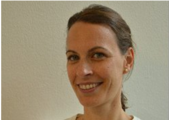
Prof. Dr. Frederike Bartels - University of Vechta
Dr. Frederike Bartels has been a junior professor at the University of Vechta since 2014. Since then, she has been investigating various aspects of improving teacher training in the primary sector and leads the project "International Mobility in the Master of Primary School Education - MAPS".
contact: frederike.bartels@uni-vechta.de
Prof. Dr. Heike Wendt
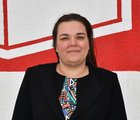
Prof. Dr. Heike Wendt - University of Graz
Dr. Heike Wendt is a Professor for Education Research and head of the Institute of Education Research and Teacher Education at the Faculty of Environmental, Regional and Educational Sciences of Graz University in Austria. Her research interests are in international comparative research and school development with a focus on questions of equity and transitions of education systems. She served for more than 10 years as national research coordinator for Germany's participation in international large-scale assessment studies and is involved in numerous international research projects and partnerships. She has published more than 10 books and 150 articles and book chapters.
Dealing with diversity and promoting equity in Primary Schools: Approaches internationally compared
Teachers all over the world face the challenge of diverse classrooms. Teachers need to be prepared to meet the needs of all children from diverse backgrounds. The course provides an international perspective on teaching and learning on primary education. In the course we will, based on school development theory, concepts of multicultural and multilingual learning, approaches to comparative education and recent findings from comparative studies, critically evaluate the extent to which different education systems facilitate diversity on various levels. The course will introduce educational theories and enables a practical, research and application-oriented understanding on how just, peaceful and tolerant concepts as a condition for successful, sustainable learning are systemically embedded.
contact: heike.wendt@uni-graz.at
Prof. Dr. Barbara Caprara
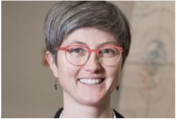
Prof. Dr. Barbara Caprara - Free University of Bozen - Bolzano
Dr. Barbara Caprara he has been an associate professor in general didactics since 2005 at the Faculty of Education at the Free University of Bolzano. She is involved in didactic innovation with a particular interest in early childhood and primary education. She promotes experimentation and carries out teaching and research activities related to learning environments, the educational use of environmental and natural resources, and the dissemination of the Montessori approach. The engagement linked to Montessori's work also involves her in various experimental and research fields, both in Italy and internationally.
Montessori-Pedagogy
The course proposes the analysis of Maria Montessori’s pedagogical approach, through the study of the salient stages of her life and the fundamental elements of her educational proposal: organization of learning environment, role of teachers and role of observation, Montessori materials and forms of lesson, cosmic education, and natural environment. In particular, the course aims to explore Maria Montessori’s life, in relation to her international experiences; to provide relevant knowledges about the main pedagogical characteristics of her Method; to analyze several elements and attitudes that can be used also in “mainstream” educational contexts. The seminar will be organized in three different stages: 1. Theoretical framework, 2. Selfstudy/Groupwork on sources related to the presented theory, 3. Analyses of research on Montessori outcomes. A visit to a Montessori Kindergarten will also be offered.
contact: barbara.caprara@unibz.it
Kaidi Nurmik

Kaidi Nurmik - University of Tallinn
Kaidi Nurmik has graduated Tallinn University and has earned a master ́s degree in Arts in Education. She is currently a PhD student and junior researcher at Tallinn University. Her field of study is student agency development through interdisciplinary learning in primary school. She has worked at school as a primary school teacher for five years and is currently a 1st grade teacher at Gaia School.
Learning outside the classroom
The course proposes the overview of interdisciplinary learning in open learning environments. Focus will be on theoretical framework and pedagogical approaches that integrate subjects and topics: theme-based, project-based and problem-based learning. Nature and didactics of interdisciplinary learning will be examined: for example, how to connect learning with real-life, how to learn by experience and engage students in the learning process. Also, the meaning of the open learning environments will be discussed and the possibilities of involving different environments in the learning process will be explored. The course will be organized in three stages: interdisciplinary learning and relevant pedagogical approaches; open learning environment and learning in different settings; an interdisciplinary learning experience design in an open learning environment.
contact: kaidi.nurmik@tlu.ee
Heddi Reinsalu
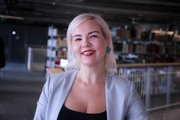
Heddi Reinsalu - University of Tallinn
Heddi Reinsalu, a graduate of Tallinn University (Estonia), holds a master's degree in Arts in Education and is currently pursuing a doctoral degree at the same institution. Her research focuses on learning engagement in music within the context of preschool and primary school music lessons. In addition to her doctoral studies, since 2020, she has also been serving as a lecturer in music didactics at Tallinn University. Her instructional responsibilities include teaching preschool teachers, primary school teachers, and music teachers enrolled in the joint curriculum offered by Tallinn University and the Estonian Academy of Music and Theatre. She is currently employed as a music teacher at Tallinn Pääsküla School.
Music in integrated learning activities
The course focuses on musical competencies and the significant role of teachers in cultivating them. Specifically, it investigates pedagogical approaches and outdoor activities that can be utilized for music instruction. Moreover, the course explores methods for activating music listening, as well as the inclusion of musical movement as an integral component of music education for children. Additionally, it examines children's musical creativity and the potential of music as a tool for enhancing learning engagement. The incorporation of proverbs and idioms in rhythm games and body percussion is also explored. The course aims to equip students with the skills to apply music instruction techniques in integrated learning activities and the development of competencies.
contact: heddir@tlu.ee
The module description can be downloaded here.
If you are interested in this module and would like to enroll, please contact Ms. Friederike-Sophie Maasch: friederike-sophie.maasch@uni-vechta.de
The program of the International Summer School 2024 can be found here.
You can find the flyer of the International Summer School 2024 here and the booklet here.
Dear students,
On March 6, 2024, an online information event for the English speaking "International Summer School of Teacher Education 2024" will take place from 5:00 - 5:30 pm. Further information about the summer school can be found on the MAPS project website:
https://www.uni-vechta.de/en/lehramtinternational-maps/about-maps/summer-schools-2
All students who are interested in participating in the summer school and who would like to sign up for the module "Teaching and Learning at Primary School from an international perspective" (6 ECTS) are cordially invited.
This is the link to the meeting room: https://webmeetings.uni-vechta.de/b/maa-um7-eic-j0f
Looking forward to seeing you there!
Your MAPS project team
Summer School Kick-off meeting (online)
June 18, 2024
4.00 pm – 5.00 pm (UTC+2) / (5pm to 6pm (EEST))
Meeting room:
https://webmeetings.uni-vechta.de/b/maa-um7-eic-j0f
Cross-cultural training
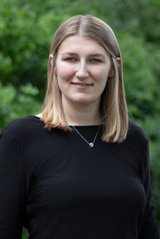
Kim Kristin Terkuhlen is a research associate at the Student Center of the Institute for Psychology and PhD candidate at the department of work and organizational and cross-cultural business psychology at Osnabrueck University. She completed her undergraduate studies of psychology at Münster University and her graduate studies of cross-cultural psychology at Osnabrueck University. As a transfer manager, she advises psychology students on issues related to transfer to practice (internships in Germany and abroad) and career. Her research focuses on boundary management, i.e. how individuals and couples manage the boundaries between their personal and professional lives. Kim Kristin Terkuhlen also works as a lecturer, individual and couples counselor, and freelance trainer for intercultural competence.
If you are coming to Germany by plane, you will likely arrive at one of the nearest airports, i.e. Bremen, Osnabrück/Münster or Hannover. From each of these cities there are regular train connections to Vechta. You can buy the ticket at one of the vending machines available at the airport or at the train station. If you prefer to be assisted by an agent, you can go to the ticket office (Reisezentrum) at the train station. Finally, you can also buy the ticket online on the website of the Deutsche Bahn (available in various languages).
Below, we provide information about train connections between Vechta and the abovementioned closest airports (Bremen, Osnabrück/Münster and Hannover). However, you can travel by train to Vechta from any other, farther away, airport in Germany. You can find information on train connections between Vechta and other German cities on the website of the Deutsche Bahn.
From Bremen airport: please take tram n. 6 in the direction university (Universität) and get off at the stop 'central railway station'. The stop is located in front of the train station, so you just need to walk (1 minute) to the main entrance. In the main hall you can find ticket vending machines and on the left the ticket office (Reisezentrum). From here, you need to take the regional train of the Nordwestbahn (NWB RB58) in the direction Osnabrück Hbf., and get off in Vechta (about halfway to Osnabrück). The RB58 departs every hour at 22 minutes past the hour from Bremen and it takes about one hour to get to Vechta. The last direct train to Vechta departs at 11:22 pm from Bremen Hbf. After this time, you will have to take a bus for part of the journey. Please be aware that there are other regional trains going to Osnabrück from Bremen, but only RB58 stops in Vechta. The ticket costs about 15€. Please consult the website or the ticket office at the Bremen central station for the exact departure times/possible delays/platform numbers.
From Osnabrück/Münster airport: please take the bus S50 in the direction Busbahnhof Ibbenbüren, then get off threre. Please walk from here into the train station Ibbenbüren and depending on the time you can either take the train RB61 in the direction Bielefeld Hauptbahnhof or the train WFB RE60 in the direction Braunschweig Hauptbahnhof. In both trains please get off at the train station Osnabrück (Hauptbahnhof). From here, please take the regional train of the Nordwestbahn (NWB RB58) in the direction Bremen Hbf. Please get off at the stop Vechta (about halfway to Bremen). The RB58 departs every hour at 26 minutes past the hour from Osnabrück and it takes about one hour to get to Vechta. The last RB to Vechta departs at 11:24 pm from Osnabrück. Please be aware that there are other regional trains going to Bremen, but only RB58 stops in Vechta. The ticket generally costs between 15€ and 20€. You can check the exact departure times/possible delays/platform numbers online or at the information desk in the airport or in the train station of Osnabrück.
From Hannover airport: Please take the tram (S-Bahn) n. S5 in the direction Paderborn Hbf-- but please get off already at Hannover train station (Hannover Hauptbahnhof). From Hannover train station, take the regional train RE1 in the direction Norddeich Mole or Bremerhaven-Lehe and get off in Delmenhorst. Here, you can take the regional train of the Nordwestbahn NWB58 in the direction of Osnabrück and get off in Vechta. For this trip, you can purchase a so-called Niedersachsen-ticket (25€ per person + 5€ for every additional person for groups of up to 5 people). However, please keep in mind that this special ticket allows you to use only regional trains within the state of Lower Saxony (Niedersachsen), and no Intercity or other long-distance trains. Of course you can also travel from Hannover to Delmenhorst with the Intercity, in which case you should not purchase a Niedersachsen-ticket but the corresponding Intercity ticket. You can check the exact departure times/possible delays/platform numbers online or at the information desk in the airport or in the train station of Osnabrück.
Depending on they way you take to get to Vechta, it could be worth it to buy the Deutschland-Ticket. Thereby you can use unlimited all local public transport (not ICE, IC or EC) for 49 euros for a whole month. You can find more information here. So this ticket can also be used for the return trip.
Once you have arrived at the Vechta train station, you can go to the university on foot (about 20 minutes), or take a cab (about 10€ from train station to university), or take a bus. There are various bus combinations, depending on the timetable. Please check the website VBN Fahrplaner by entering as departure station 'Vechta ZOB' and as destination 'Vechta Universität' for an updated solution. Busses circulate on weekdays between 6:30am and 8pm only. You can find a comprehensive bus map here and the timetables for each bus line here. A one-way ticket costs 1,50€ or more, depending on the destination, and can also be purchased on the bus (please ask the bus driver).
When you take the bus to get to Vechta, you will arrive at the Autohof Bakum. From there you can take a cab to Vechta. It would take 12min to the train station, 13min to the university or the Schäfers Hotel and 15min to the guest house Gut Welpe by cab. Some numbers to call a cab are: 044416915 or 044417788. Therefore, please don't forget to use +49 as the country calling code and it would also help if you book the cab before. Another possibility would be taking the bus but it takes a longer time to arrive.
From the train station Vechta ...
... to the guest house Gut Welpe which contains the apartments Oslo, London, Hamburg and Alte Mühle, it takes up to 33min by foot, 8min by cab or 20 to 30mins by bus. Depending on your time of arrival there are several bus lines possible such as the 602 or the 603. Please have a look at the 2 links mentioned earlier which show the comprehensive bus map and the timetables for the bus lines so you can also see other options. The address of the Gut Welpe is Welpe 5, 49377 Vechta.
... to the guest house Gut Füchtel which contains the Scottish-Irish Apartment, it takes up to 30mins by foot, 9mins by cab or 25 to 30mins by bus. The address is Füchtel 4, 49377 Vechta.
The guest houses Gut Welpe and Gut Füchtel are 2 kilometers (25mins by foot) apart.
The address of the university is: Driverstraße 22 - 49377 Vechta.

Apartments and rooms for the international guest students have been reserved at the Gut Welpe.
The rooms, that are available at the Gut Welpe, are the apartments La Rochelle, Glasgow and Alte Mühle. La Rochelle offers space for 4 people, 3 people can stay in Glasgow and the apartment Alte Mühle is for 2 people. All of them also include an equipped kitchen unit.
For more information, please follow the link below:
Guest house Gut Welpe: www.gut-fuechtel.de/en/guesthouse/guesthouse-gut-welpe
- Stoppelmarkt Vechta
- City of Vechta
- Zitadellenparc Vechta
- Beachbar Zitadellenparc
- Museum im Zeughaus
- open-air concerts
- art and opera performances in the JVA für Frauen (women’s prison)
- theatre or literary events
- Easy Strike Bowlingcenter Vechta
- Toncoole (natural pool) Vechta
- playing tennis, badminton, squash or table tennis at Tennispark Vechta
- cycling and hiking trails
- weekend-trip to Netherlands
- City-trip Bremen
- City-trip Hamburg
- Sea-Time Bremerhaven
- Rasta Vechta
- Banane (bar)
- Kunstverein Kaponier (art exhibition)
WIFI: Uni Vechta Gast
Password: Summerschool2024
The collaborative summer school of the projects LEILA and MAPS is successfully completed for the second time. From the 14th to the 27th of August 2023 international students and Iraqi university staff could explore different aspects of inclusive education again. Moreover, the program included visits in several educational institutions.
The Ludgerus-Schule Vechta as well as the Janusz-Korczak-Schule Vechta who belongs to the corporate division Bethel im Norden, published a press release. Both schools were visited in the context of the summer school.
The participants of the Summer School 2022 made some statements about their experiences:
Amazing group where the atmosphere was friendly and safe. No one had to be afraid to say something wrong. Everyone was open to discussion and sharing.
Having received so many different ideas/methods that now, I have a better understanding of what I need to do to be effective: cultural dimensions, cooperation, Montessori method, etc
I have much more confidence speaking in English in front of many people. The gain in intercultural level was very high. So much new knowledge and friendship!
I would do it again! The time flew every day and this program was very motivating and inspiring!
I know a lot more of different layers of multicultural diversity. Now I can notice better the different aspects of it and deal with different problems.
It was a wonderful experience!
The courses and teachers were incredibly interesting and important for nowadays.
I loved it!

